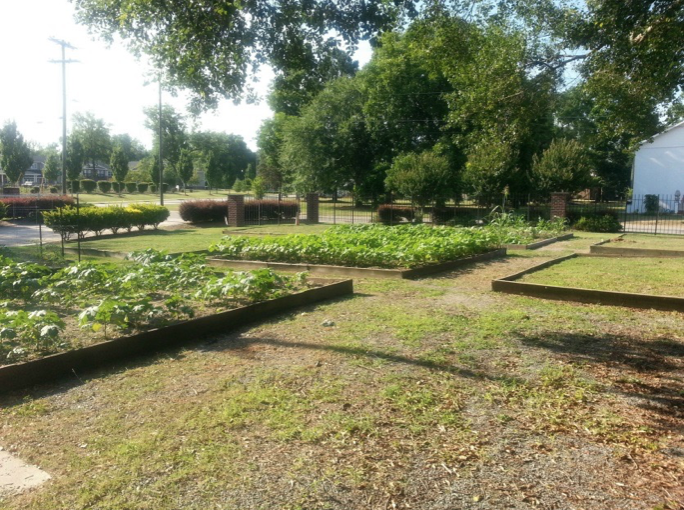Insights from the Community Garden
5 October 2016

I spend substantial time in the Fayetteville Community Garden. This is because I grow vegetables in a plot there along with volunteering to help maintain and beautify the garden. This five acre, 94 plot garden, is proving to be a microcosm of what I see in our country from a distance. That is, I see media reports and hear accounts from other people that trouble me as to what is happening in America. In the garden I see close-up, incidents that corroborate what troubles me about the larger society.
Among these corroborated concerns is the course America seems to be taking relative to redistribution of wealth. I agree with Charles Payne, a Fox Business Network contributor and host of Fox’s Making Money with Charles Payne. I understand Payne to say there are many people who believe America has peaked in ability to expand the economy and provide opportunity for financial advancement; consequently, there must be redistribution of wealth. This assessment is even more troubling when one considers the primary approach being used by those who so strongly pursue redistribution of wealth. I contend what they are doing is summarized well in an article titled “Work Ethic Definition & Elements of a Strong Work Ethic” at www.cleverism.com when speaking of socialism:
“Traditionally, work ethic has been understood as a value based on hard work and diligence. Capitalists, for example, believe in the necessity of working hard and in consequential ability of enhancing one’s character. Socialists suggest that a concept of “hard work” is deluding the working class into being loyal workers of the elite; and working hard, in itself, is not necessarily an honorable thing, but simply a way to create greater wealth for those at the summit of the economic pyramid.”
Given that the thinking in the second half of the quote above is prevailing in America, the result is a multitude of entitlement programs where citizens receive benefits without having invested anything. Federalsafetynet.com states, “Welfare Programs include 13 separate programs to fight poverty (…) and the Medicaid Program which provides health care to low-income Americans. Welfare Programs and Medicaid are non-contributory, meaning recipients are entitled to the benefits even though they have made no contributions to the programs through taxes.”
The pressing question is: are these anti-poverty programs effective? A paper by Robert Rector and Jennifer A. Marshall titled “The Unfinished Work of Welfare Reform” states that when measuring poverty, the U.S. Census Bureau “omits more than $800 billion in means-tested government cash, food, housing, and medical benefits; it takes into account only what Americans earn on their own, without government assistance.” Referring to that approach, Rector and Marshall give this assessment:
“And what does this measure tell us? That there has been essentially no improvement in self-sufficiency since the War on Poverty began more than four decades ago. In 1966, the share of the population living below the poverty (self-sufficiency) threshold was 14.7%; by 2011, it had actually risen — to 15.0%. While the material living conditions of less affluent Americans may have improved over time, when it comes to President Johnson’s original goal — reducing the “causes” rather than the mere “consequences” of poverty — our welfare policies have failed. Many parts of the population are in fact now less capable of self-sufficiency than they were when the War on Poverty began.”
Also in this wealth redistribution effort that I see from a distance is welfare reform from 1996, during the presidency of Bill Clinton. Two bits of information from the paper by Rector and Marshall referenced above. First, focus on the work requirement of that reform:
“For all the hype about the 1996 law, it dramatically reformed only one of nearly 80 federal means-tested programs providing aid to the poor. The reform replaced the largest cash-welfare program, Aid to Families with Dependent Children (AFDC), with a new program, Temporary Assistance for Needy Families (TANF), which included work requirements and a time limit on aid — all funded through block grants to states.”
Then on the impact of this reform:
“The immediate results clearly vindicated the conservative hypothesis about “workfare,” as droves of former (and potential future) welfare dependents became productive employees in the private economy. So successful was the policy overhaul, in fact, that many conservatives concluded that their work on welfare was finished. But the reactions of both sides were overwrought: Liberals’ dire predictions that millions more Americans would fall into poverty and that social dysfunction would increase proved mistaken; conservative workfare, meanwhile, has become the victim of its own success.”
Then Robert Rector writes in a 2012 article titled “How Obama has gutted welfare reform:”
“But the Obama administration has jettisoned the law’s work requirements, asserting that, in the future, no state will be required to follow them. In place of the legislated work requirements, the administration has stated, it will unilaterally design its own “work” systems without congressional involvement or consent. Any state will be free to follow the new Obama requirements ‘in lieu of’ the written statute.”
The cost of existing entitlement programs is tremendous and growing. Many politicians promise even more programs and intend to pay for them by raising taxes on the wealthy.
To this point is what I see from media and research. This can be summarized as America rapidly moving from espousing hard work and seeking opportunity for advancement to a nation discouraging hard work; fermenting disdain by citizens of low income toward the wealthy; and promoting an entitlement mentality that causes far too many people to believe society is to provide for them “from the cradle to the grave.”
Now a couple of experiences from the Community Garden that corroborate this summary assessment of what I believe America is fast becoming. I was working in my garden plot when a lady rode up in a car driven by another lady. The passenger gets out, approaches me, and explains that she needs food for her family because her Food Stamps will not come for another two days. I tell her there is nothing in my garden, but maybe two men sitting near their plots might help. She talks with them and comes back mumbling about how they would not help her. I asked if she realized she could rent a plot for just $25 per year and grow vegetables. Her response was she had three kids, was a single parent, and did not have $25 to rent a plot. In a huff, she got in the car and left.
My thought was, by gardening, she could not only grow food, but have those three children help and, in the process, learn the value and necessity of work. This won’t happen because she has come under the new American spell that others are to provide for her. Sadly, by observing their mother, those three children will likely take on the same attitude.
Another day, a lady drives up in a nice SUV, gets out, and starts asking me to name various vegetables in several plots. I begin answering her questions, but then ask if she has a plot. She says, “No,” but she wants to pick some vegetables. I explain I can’t give her permission to take vegetables from plots that belong to other people. She responds, “This is a community garden.” I tell her “community garden” does not mean that you take what you want without permission and I ask her to leave. She moves to leave and I walk away, but look back. The lady is in a plot picking tomatoes. I yell, “Ma’am, please stop taking vegetables and leave the garden.” She gets in that nice SUV and kicks up dust on the garden road as she leaves, obviously angry. By the way, this lady had a young girl with her who looked to be about twelve years old.
I hold here is another person who not only feels entitled, but also disrespects the rights and property of others. This is an attitude born of, and nurtured by, all of what is described in the opening of this column. Furthermore, given a choice of the woman she rode up with, or me, as a role model, that young lady will likely choose the woman and take on her attitude to the detriment of herself and American society.
If not already done, I encourage you to read this column slowly and thoroughly. Then determine what you might do to help turn America back to the course where hard work, individual responsibility, and respect for others prevail.





Leave a Reply